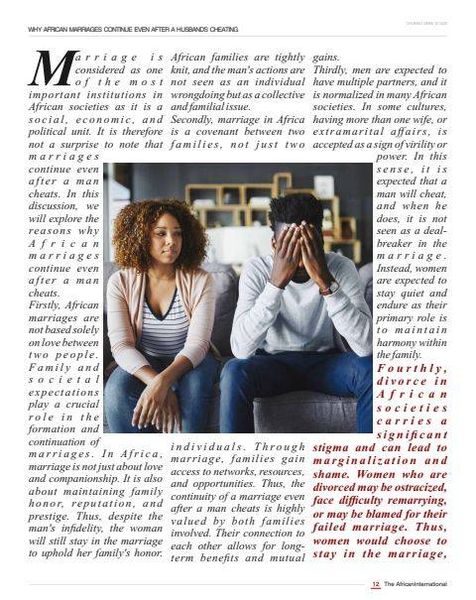By: Ollus Ndomu

Marriage is considered as one of the most important institutions in African societies as it is a social, economic, and political unit. It is therefore not a surprise to note that marriages continue even after a man cheats. In this discussion, we will explore the reasons why African marriages continue even after a man cheats.
Firstly, African marriages are not based solely on love between two people. Family and societal expectations play a crucial role in the formation and continuation of marriages. In Africa, marriage is not just about love and companionship. It is also about maintaining family honor, reputation, and prestige. Thus, despite the man’s infidelity, the woman will still stay in the marriage to uphold her family’s honor. African families are tightly knit, and the man’s actions are not seen as an individual wrongdoing but as a collective and familial issue.

Secondly, marriage in Africa is a covenant between two families, not just two individuals. Through marriage, families gain access to networks, resources, and opportunities. Thus, the continuity of a marriage even after a man cheats is highly valued by both families involved. Their connection to each other allows for long-term benefits and mutual gains.
Thirdly, men are expected to have multiple partners, and it is normalized in many African societies. In some cultures, having more than one wife, or extramarital affairs, is accepted as a sign of virility or power. In this sense, it is expected that a man will cheat, and when he does, it is not seen as a deal-breaker in the marriage. Instead, women are expected to stay quiet and endure as their primary role is to maintain harmony within the family.
Fourthly, divorce in African societies carries a significant stigma and can lead to marginalization and shame. Women who are divorced may be ostracized, face difficulty remarrying, or may be blamed for their failed marriage. Thus, women would choose to stay in the marriage, despite the man’s infidelity, to avoid societal repercussions.
Fifthly, financial stability is a vital component of marriage in Africa. Women are often not economically independent and are expected to rely on their husband financially. Divorce in this case would mean a loss of monetary support, which could lead to poverty and destitution. Therefore, even when men cheat, women are encouraged to stay in the marriage to secure their economic livelihood.
Sixthly, African marriages are not just between two people but are often multigenerational. Grandparents, parents, and extended family play a significant role in the marriage, and their interests are also considered. The man’s infidelity may be seen as a personal matter between the couple, but the entire family is impacted by the decision to stay in the marriage or not. The family’s input in the decision-making process means that marriage continues, even after a man cheats.
Seventhly, cultural practices and beliefs play an essential role in African marriages. In some cultures, marriage is seen as a sacred union and regarded as unbreakable, even in cases of infidelity. Furthermore, in these cultures, faith and spirituality guide every aspect of life, including marriage. The belief that marriage is a divine union blessed by God makes it hard for anyone to contemplate divorce regardless of what has transpired.
Finally, African marriages are characterized by interdependence, whereby marriages are not just about love and companionship but also about mutual support and survival. In this sense, marriages are seen as a collective endeavour to build a sustainable future. Even when a man cheats, the woman is often expected to remain in the marriage, and through her efforts, she can work to repair the damaged relationship.
Conclusionary, African marriages continue even after a man cheats due to cultural and societal reasons. The desire to maintain family honour, financial stability, societal expectations, and the influence of extended family all contribute to the decision to stay in the marriage. Ultimately, African marriages are complex and multifaceted, and people must weigh all the factors involved before making significant decisions about their marriage. The reasons for continuing a marriage after infidelity may not be easily understood by people from other cultures, but they speak to the unique complexities of African societies and the meaning attached to marriage in these contexts.

